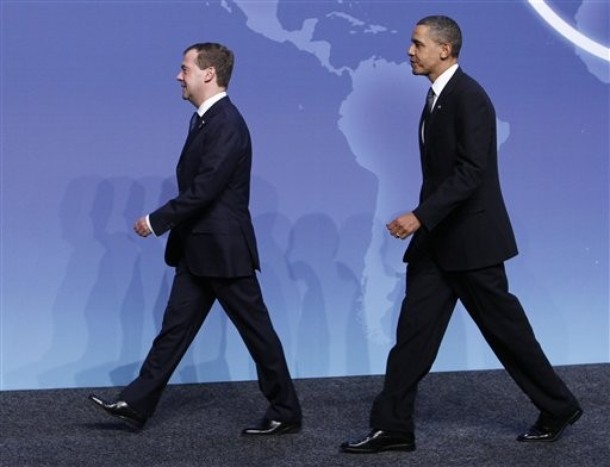
From David J. Kramer, the Washington Post: Some 14 months ago on this page, I warned against a "grand bargain" between the United States and Russia as part of the Obama administration’s reset efforts with Moscow. One concern then was that the administration would pursue a "Russia first" policy at the expense of Russia’s neighbors. The problem, it appears, is actually worse: The administration seems to have moved toward a "Russia only" approach, neglecting and even abandoning other countries in the region.
The most glaring example of this trend came this week. In a message accompanying the White House’s resubmission to Congress of a nuclear cooperation pact with Russia, President Obama declared that the situation in Georgia "need no longer be considered an obstacle to proceeding" with congressional review of the agreement. …
It would be one thing to resubmit the 123 treaty noting that the United States still has serious disagreements with Russia over Georgia. Instead, by stating so baldly that the situation in Georgia is no longer an obstacle to advancing Russian-American relations, the administration is essentially abandoning the Georgians and giving Russia a green light to continue to engage in provocative behavior along its borders. …
In the interest of removing irritating issues from its agenda with Moscow, will the Obama administration sell out Georgia and Moldova by dropping insistence on Russian withdrawal from those two countries? Or will it do the right thing, treat "host-country consent" as a sacrosanct principle and use efforts to revive the CFE Treaty as a mechanism to facilitate eventual Russian withdrawal from Georgia and Moldova?
Obama and other senior U.S. officials have repeatedly said they do not recognize a Russian "sphere of influence," but actions, or non-actions, speak louder than those words. Through its neglect of countries in the region except for Russia, the administration is ceding to Moscow exactly such a sphere.
David J. Kramer is a senior transatlantic fellow at the German Marshall Fund of the United States and a former deputy assistant secretary of state for European and Eurasian affairs. (photo: AP)
Image: ap%205%2017%2010%20Medvedev%20Obama.jpg
